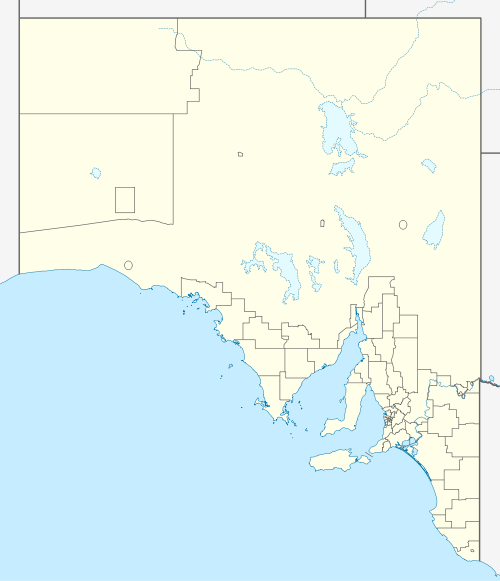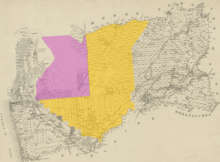District Council of Yatala
The District Council of Yatala was a local government area of South Australia established in 1853 and abolished in 1868.
| District Council of Yatala South Australia | |||||||||||||||
|---|---|---|---|---|---|---|---|---|---|---|---|---|---|---|---|
 District Council of Yatala | |||||||||||||||
| Coordinates | 34°50′S 138°37′E | ||||||||||||||
| Established | 1853 | ||||||||||||||
| Abolished | 1868 | ||||||||||||||
| State electorate(s) | Yatala (1857-1868) | ||||||||||||||
| |||||||||||||||
The council was named after the Hundred of Yatala which was proclaimed in 1846 in the County of Adelaide,[1] Yatala likely deriving from a Kaurna word 'yartala' referring to the flooded state of the plain either side of Dry Creek after heavy rain.[2][3] The name was used to describe a large portion of the Adelaide Plains from Port Adelaide in the west to Tea Tree Gully in the east.[4]
History

The council was proclaimed on 16 June 1853 with Thomas Abbot, Daniel Brady, John Chamberlain, John Harvey and John Ragless, the younger, appointed as inaugural councillors.[5]
At the time its establishment, Yatala council area covered approximately 58 square miles (150 km2)[6] on what is now the inner suburbs north-west, north and north-east of Adelaide.[7] It extended from Salisbury in the north, to the River Torrens in the south east, and to Torrens Road and the borders of the former City of Port Adelaide in the west. The council area covered a major central portion of the cadastral Hundred of Yatala. North Adelaide's parklands and the Torrens formed the southern boundary of the council area.
The council area included the villages of Enfield, Prospect, Klemzig and Walkerville. Surveying of Yatala was started in 1837 and continued until completed in late 1850s. The survey showed the area had limited fresh water.[7]
The first Clerk, Collector, and Surveyor to the District Road Board of the Hundred of Yatala, was appointed in 1850. This was architect Edward Prowse, who later came to prominence in Geelong, Victoria.[8] Prowse resigned in 1852.[9]
In 1854 Yatala Labour Prison was established near Dry Creek, which passed from east to west through the centre of Yatala. The location of the prison meant inmates were able to work at the creek quarrying rock for roads and construction.[10]
In the first six years after the establishment of Yatala council, two pockets of land were removed from the council area to be local government areas in their own right. A part at the northern end was taken for the new District Council of Munno Para West[11] The new Village of Walkerville split from Yatala on 5 July 1855.[7][12][13] In November 1855 and April 1859 further portions of Yatala District Council were moved to the Village of Walkerville council.[13]
Bailliere's South Australian gazetteer and road guide, published in 1866, contains a brief description of the Yatala council area. It recorded the population of the district as being 3091, the number of houses as 642, the cultivated land as being 15,194 acres (6,149 ha), and the council chair as J.W. Sudholtz of Gilles Plains.[6]
In 1868 the District Council of Yatala was divided at Dry Creek into the District Council of Yatala South and the District Council of Yatala North.[7][14] Yatala North ultimately was absorbed into the new District Council of Salisbury in 1933. Yatala South ultimately became the District Council of Enfield in 1933, after the much earlier severance of land for the Village of Prospect in 1872[7][15][14]
Neighbouring local government
The following adjacent local government bodies co-existed with the Yatala council:
- District Council of Munno Para West lay immediately north from its establishment shortly after Yatala council in 1853, and lay north west from its extension westwards in 1888.
- District Council of Munno Para East lay north east from its establishment in 1854.
- District Council of Highercombe lay immediately east. The District Council of Tea Tree Gully seceded from the north part of Highercombe in 1858, creating another eastern neighbouring council.
- District Council of East Torrens lay south east, across the River Torrens until the northern part seceded to form the District Council of Payneham in 1854. The District Council of Stepney seceded from the west part of Payneham in 1867, creating another south eastern neighbouring council to Yatala just a year before Yatala itself was split into smaller councils.
- City of Adelaide northern parklands lay immediately south.
- District Council of Hindmarsh (established 1853) lay south west until it split into the District Council of Woodville and Corporate Town of Hindmarsh in 1875.
- The portside cluster – Town of Port Adelaide, Portland Estate council, and Queenstown and Alberton council, from their respective establishments in 1855, 1859 and 1864 – lay immediately west of Yatala council.
Notes
- "Search for 'Hundred of Yatala' (ID SA0030790)". Government of South Australia. Retrieved 15 February 2016.
- Rob Amery (March 2009). "Weeding Out Spurious Etymologies: Toponyms On The Adelaide Plains". In Luise Hercus; Flavia Hodges; Jane Simpson (eds.). The Land is a Map: Placenames of Indigenous Origin in Australia (PDF). ANU Press. p. 165-180. ISBN 9781921536571.
Yatala most likely derives from yertalla 'water running by the side of a river; inundation; cascade'. As Manning (1986:238) observes 'in winter when water flowed from the hills, over the plains, the Dry Creek area became a morass'.
- "Place Names of South Australia - XYZ (Yatala)". State Library of South Australia. Retrieved 28 February 2007.
A Kaurna tribal word meaning 'water running by the side of a river'. In winter, when water flowed from the hills, over the plains, the Dry Creek area became a morass.
- The Official civic record of South Australia : centenary year, 1936. Adelaide: Universal Publicity Company. 1936. p. 32.
According to Mr. [Rodney] Cockburn "Yatala" was the name applied by the Weera tribe of aborigines to the country north of the Torrens to the Little Para.
- "Proclamations" (PDF). South Australian Government Gazette (24 ed.). Government of South Australia. 1853: 396-397. 16 June 1853. Retrieved 19 July 2017.
[...] I do hereby appoint Thomas Abbott, of the Little Para; Daniel Brady, of the Dry Creek; John Chamberlain, of the Pine Forest; John Harvey, of the North Para; and John Ragless, the younger, of the Great North Road, ratepayers within the said District of Yatala, to be the first District Council of the said District of Yatala.
- Whitworth (1866) p. 283
- "Our History: Enfield History". City of Port Adelaide Enfield. Archived from the original on 3 April 2015. Retrieved 23 February 2011.
- "DISTRICT ROAD BOARD". South Australian Register. Adelaide. 8 February 1850. p. 3. Retrieved 12 April 2014 – via National Library of Australia.
- "Resignation". South Australian Register. Adelaide. 6 February 1852. p. 3. Retrieved 12 April 2014 – via National Library of Australia.
- Lewis (1985) pp. 174–175
- Marsden (2012) p. 32 "North of the Little Para River the new DC Munno Para West was separated from Yatala and proclaimed on 27 April 1854."
- "Corporation of the Town of Walkerville". Local Government Focus. May 2005. Retrieved 13 July 2011.
- Marsden (2012) p. 32 "In April 1855, Walkerville ratepayers petitioned to allow a very large part of Yatala to be created as a separate District of Walkerville; the size of the division was opposed by other ratepayers, and on 5 July 1855 a much smaller DC of Walkerville was proclaimed, although it gained additional portions of Yatala District on 1 November 1855 and on 21 April 1859."
- Marsden (2012) p. 32 "The difficulty of administering such a large area required Yatala Council’s final division on 18 June 1868 into DCs of Yatala North and Yatala South (the area south of Dry Creek)."
- "Historical Timeline". City of Prospect. Archived from the original on 26 September 2011. Retrieved 13 July 2011.
- District Council of Enfield Historical Records 1853–1935, City of Port Adelaide Enfield, retrieved 28 March 2019
References
- Lewis, H. John (1985). Enfield and The Northern Villages. The corporation of the city of Enfield. ISBN 0-85864-090-2.
- Marsden, Susan (2012), A History of South Australian Councils to 1936 (PDF), Local Government Association of South Australia
- Whitworth, Robert Percy, ed. (1866). Bailliere's South Australian gazetteer and road guide: containing the most recent and accurate information as to every place in the Colony. F.F. Bailliere.